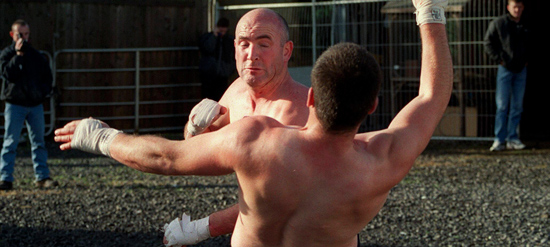We have to build the audiences for the things we love. We vote for the culture we want with our dollars. It’s not enough to help bring beautiful & better films into this world; we have to find the ways to make them social, so that the communities can discover them. I hold incredible respect for the curators. I think such activity is part of the producers’ job description. I have run a screening series now for two years; it may not be easy, but it is rewarding.
For these reasons, I am quite pleased to introduce you to Naiall McKay, who has some recommendations for all of in the arena of niche film festivals — it is a bare knuckle affair.

Zero budget Festival Programming: Ten Do’s and Don’ts About Programming a Niche Film Festival.
What had started out as a hobby has taken over my life and become a full time job – but without the pay – of course. But that’s the indie film biz for you. Few people are going to make a killing from a small film festival. This is my third film festival that focuses on Irish films. I started the San Francisco Irish Film Festival eight years ago then co-founded the Los Angeles Irish Film Festival four years ago. When I arrived in New York last winter, I saw an opportunity to start an Irish screening series to showcase films that would otherwise not get seen in the Big Apple. My objective is to help Irish film and filmmakers make their way in the US. Seemed odd to me that an Irish plumber or bricklayer could arrive in New York and get a job in couple of hours, but Irish filmmakers have a tough time navigating the US market.
Irish Film is a curious beast. It’s not foreign enough to be considered foreign and not American enough to compete with US independent cinema. In Ireland, local films have a hard time going up against the US blockbusters and have an equally tough time competing with US indie flicks. Local filmmakers shy away from American’s obsession with the hero’s journey and try instead and follow in the footsteps of European art films. It’s taken time to grow the craft of filmmaking in Ireland. Now however, Irish film is at its most interesting juncture in history. The country produces some twenty to thirty feature films each year and while ten years ago it would have been unusual for an Irish film to be featured in Cannes, Sundance, Telluride, or Toronto. Now it’s unusual if there isn’t. There’s four Irish films in Toronto this year. Most years, at least one film, usually a short, gets an Academy Award nomination.
There are ten to fifteen world-class filmmakers who are producing a steady flow of excellent films. Well-known directors such as John Carney (Once) and Kirsten Sheridan (August Rush) have joined forces with lesser-known directors such as Lance Daly (Kisses) and formed a production hub in Dublin called The Factory. Meanwhile, new directors such as Lenny Abrahamson, Ken Wardrop, and Juanita Wilson are producing critically acclaimed films that are beginning to do well in Europe as in the US.
This year, I’ve been fortunate because I will have the New York premiere of the documentary Knuckle, a visceral look at bare knuckle boxing among the Irish Traveller community (HBO are turning it into a dramatic series), the Galway Film Fleadh-winning feature Parked, with Colm Meaney, and The Runway, starring Demián Bichir (Weeds). All three films will get be released in the United States in the next few months. I will be bringing all three films and their filmmakers on a three city tour of New York, San Francisco and Los Angeles. Irish Film New York is co-presented by NYUs Glucksman Ireland House and funded by Culture Ireland’s Imagine Ireland Program, The Irish Film Board and Moet Hennessy USA. So here are some of the lessons that I have learned about creating a new festival:
Top Ten Dos and Dont’s
1. Do
Know your audience. Like independent film, each start-up film festival needs a base. The base for the San Francisco Irish Film Festival and for Irish Film New York is Irish ex-patriots between ages 25 and 50. They are a vastly different audience from the Irish immigrants of yesteryears. Find this core base that will be the foundation of your festival audience. But having said that, your base will keep your festival alive, but it’s not what will make it prosper. You’ll need to reach beyond the niche to independent cinema lovers.
2. Do
Program only those films that you want to watch until the end. What are my criteria? Films that make me laugh or cry, make me angry, frightened, or sad, films that crawl into a space in my brain and just won’t leave.
3. Do
Create as many partnerships as possible. Partnerships are the key to a low budget and a big success. Where possible, partner with film distributors, cultural organizations, museums, newspapers and businesses. Partnerships are free and they help grow your festival’s reach and presence.
4. Do
Low budget festivals like Blanche Dubois “always depend on the kindness of strangers.” Your festival will get nowhere without lots of favors. In turn, always treat your festival as an opportunity to provide services to others. This can mean something as small as taking a filmmaker out for a pint or making sure you introduce a filmmaker to a potential distributor. If you’re only in this for what you can get out of it, then your festival will be short-lived.
5. Do
Be careful how you define your niche films. Irish Film has become a little tricky in the last few years. I define it as films made in Ireland or with an Irish cast. There are a number of excellent films that are financed by the Irish Film Board and made by an Irish directors abroad that I’d love to program. Irish filmmaker Juanita Wilson’s “As If I’m not There,” for example is beautiful film, but it takes place during the Bosnian war so it’s a hard sell as an Irish film. I am not against programming these films but I may need to create a special program called The Irish Abroad to tell my audience what they are getting.
6. Do
Go to events where your target audience may be and announce your festival. Nothing works better than a personal invitation. Tell them about the rare opportunity they have to attend your festal. This is by far the best way get your audience.
7. Don’t
Don’t produce large gala events unless you want to spend your time producing large gala events. This will become your job. They generally soak up all the money they earn. They can be useful for building profile but building profile becomes its own job and you want to focus on screenings films.
8. Do
Do be aware that inviting celebrities and stars to come to your festival will cost a great deal of money. They usually fly first class, take limousines and bring their own hair and makeup people. And why not? They are at the top of their game. But make sure you have an extra $10 K in the kitty jar. Speaking of the kitty jar…
9. Do
Reduce your budget to zero or as close to zero as possible. Partner and profit share with your festival venue, if possible. Find sponsors who will underwrite specific costs. For example, perhaps they can give you a voucher for your postcard printer or lend you their PR agency or pay for airline tickets out of their travel budget. Cash donations are hard to come by and all your time will be spent fundraising instead of putting on the festival. Having said that find a way to pay yourself for your time. [OK, so I’ve not quite figured that one out yet but I’ll let you know.]
10. Don’t
Take it personally. Remember the people who let you down, don’t give you their films, don’t return your phone calls, ignore you pleas and walk straight by you at parties don’t hate you personally. So move on and remember you’re doing this for fun.

Niall Mckay is a filmmaker and festival programer. He can be reached at mediafactory.tv or at irishfilmnyc.com
THE IRISH SCREENING SERIES IS AT THE CANTOR FILM CENTER AT NYU SEPT 30 – OCT 2nd





